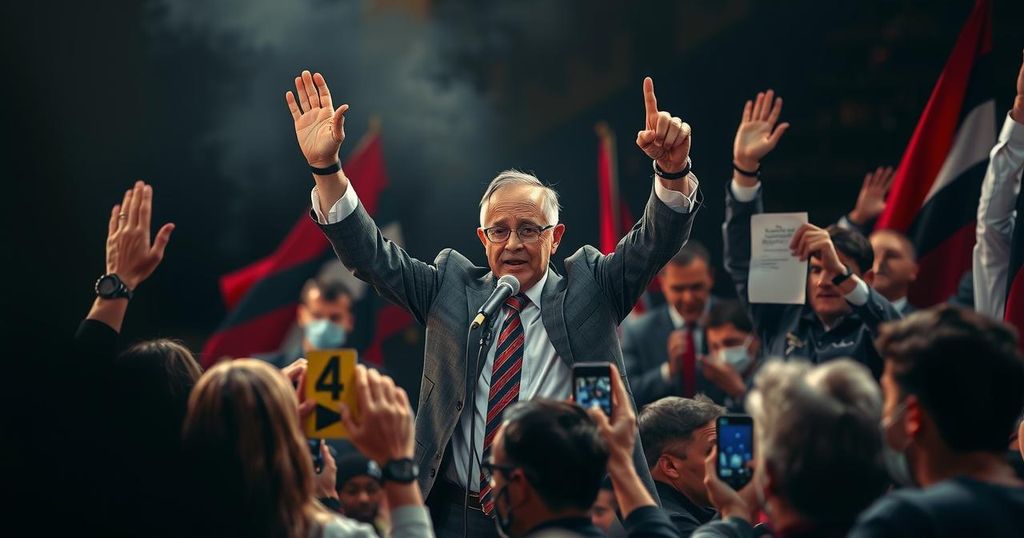Georgia’s Ruling Party Wins Election Amid Opposition Claims of Fraud

Georgia’s ruling party, Georgian Dream, has won the parliamentary elections, achieving over 54 percent of the vote, but protests from opposition parties deem the elections a ‘constitutional coup’ and fraudulent. Despite winning 89 seats in the 150-member parliament, Georgian Dream falls short of an absolute majority for constitutional amendments. The results highlight a divide in Georgia’s political allegiance between further integration with the West or deepening ties with Russia, sparking significant unrest and allegations of electoral misconduct from opposition groups.
The governing party in Georgia, Georgian Dream, has emerged victorious in the recent parliamentary election, as reported by the electoral commission. The election results, which have garnered significant opposition protests labeling the vote a “constitutional coup,” show that Georgian Dream obtained over 54 percent of the vote, securing 89 out of 150 parliamentary seats, which allows them to govern but does not provide the absolute majority necessary for constitutional amendments. With the preliminary results nearly complete, the opposition coalition managed to acquire more than 37 percent of the vote, with the largest share belonging to the Coalition for Change at approximately 10.8 percent. For many pro-Western citizens, the election represented a critical decision point between deepening ties with Russia, favored by the governing party, and aspiring for expedited EU integration, supported by the opposition. Given that the European Union had cautioned that this election would serve as a significant gauge of democracy in Georgia, the outcome has been met with disappointment from those backing western alignment and reform. In defiance of the results, opposition leaders have declared the elections fraudulent. Tina Bokuchava, the leader of the opposition United National Movement, accused the government of falsifying the results and asserted that the election had been “stolen,” declaring, “This is an attempt to steal Georgia’s future.” Nika Gvaramia, from the Ahali party, echoed these sentiments by labeling the electoral process a “constitutional coup.” Reports of violence and irregularities during the electoral process have also surfaced, inciting further claims of electoral misconduct. A notable Georgian monitoring organization has requested the annulment of the results but has yet to substantiate claims of widespread falsification rigorously. Videos circulating on social media highlighted instances of ballot manipulation, including one footage that depicted a man inserting multiple ballots into a ballot box during a scuffle with election officials. Bidzina Ivanishvili, the reclusive founder of Georgian Dream, expressed his satisfaction with the electoral results, asserting that achieving success in such difficult circumstances reflects the capability of the Georgian populace. Despite pledging to seek EU membership, the European Union has previously indicated that Georgia’s application remains stalled due to concerns regarding Georgian Dream’s authoritarian inclinations. Ivanishvili’s campaign ultimately centered on a narrative portraying the potential dangers of Western involvement and an imminent war, claiming that his party is the only bulwark against such threats. Amid mounting tensions and differing opinions on the electoral process, some individuals have expressed concern about the nation’s trajectory. One voter, Tamta Kukhaleishvili, remarked on the prevailing political shift, stating, “For me, it’s not a country I want to live in.”
The recent parliamentary elections in Georgia have deeply polarized the political landscape, particularly between pro-Western opposition parties and the ruling Georgian Dream party, which has cultivated closer ties with Russia in recent years. The significance of these elections extends beyond mere governance; they reflect a broader struggle over Georgia’s geopolitical alignment, between aspirations for European integration and Russian influence. The electoral commission’s announcement of Georgian Dream’s victory has incited widespread protests and allegations of electoral fraud from opposition leaders, challenging the legitimacy of the election. The Emboldened Georgian Dream party’s narrative suggests a portrayal of external threats, thereby justifying its continued governance. These dynamics are critical as Georgia navigates its future relationship with both Western entities and its historical ties with Russia.
In summary, the Georgian Dream party’s electoral victory has sparked immediate backlash from opposition groups, who contest the integrity of the electoral process and the legitimacy of the results. With the party obtaining a parliamentary majority but falling short of necessary numbers for constitutional changes, the political landscape remains contentious. The aftermath of the election will likely have significant implications not only for Georgia’s internal politics but also for its international alliances, particularly with the European Union. As protests proceed and further evaluations from monitoring organizations are awaited, the situation in Georgia reflects a critical juncture in its ongoing struggle for democratic governance.
Original Source: www.aljazeera.com






